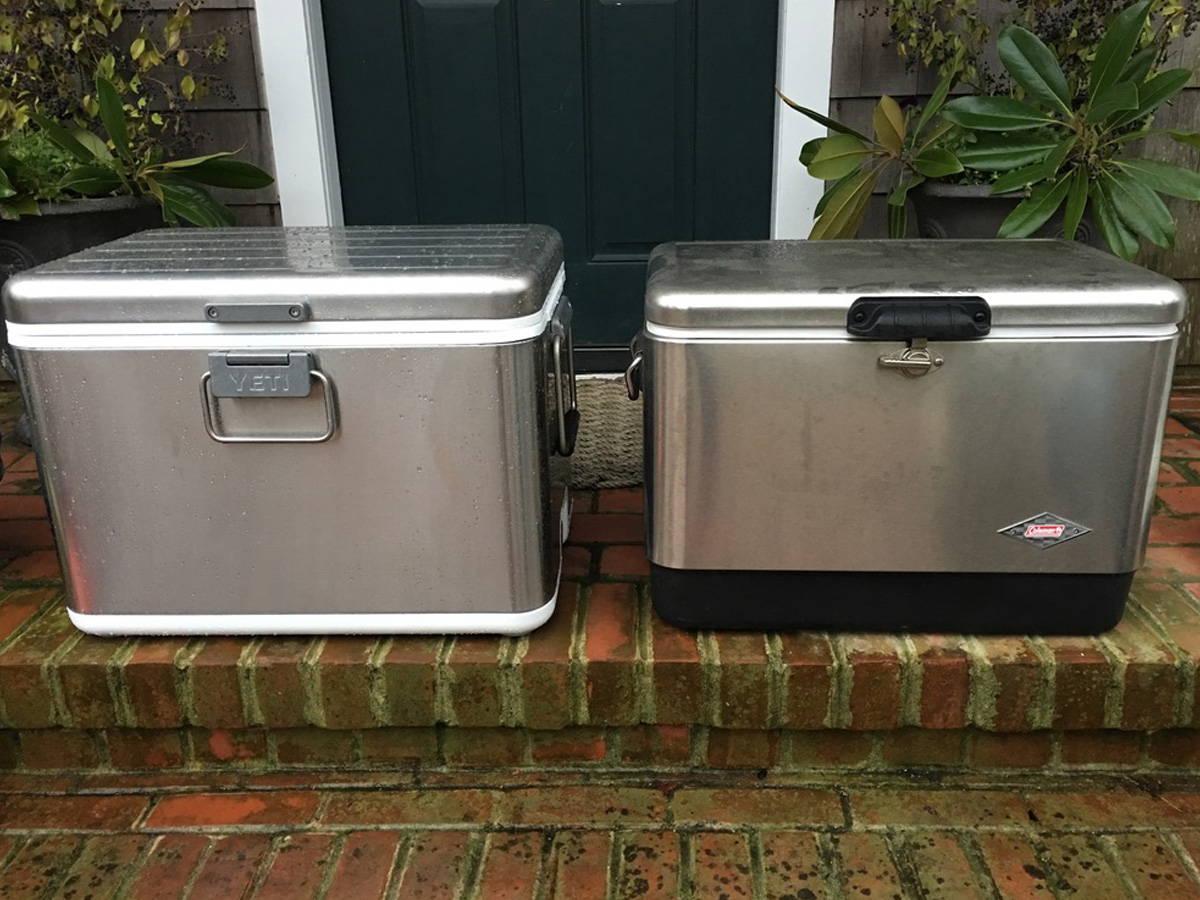- We all know Coleman ($170) as the pedestrian classic and Yeti ($800) as the sleek new kid in town. But is the hefty price difference really worth it?
- Both of these coolers are made with stainless steel, both of them are insulated, and they can both hold almost 30 12-ounce cans with a 2:1 ice to can ratio.
- Both, in effect, will do the trick, but the Yeti V Series is built to last. Here’s why.
We get it. It’s hard to fathom why a cooler might cost more than, say, an iPhone, or a refrigerator. Just know this: Either the Yeti V Series or the Coleman Steel Belted cooler will serve you well. It will do an excellent job of keeping things cold, and it will probably class up whatever joint you grace with it.
But there are some crucial differences to note before investing $170, let alone $800, in a cooler.
Yeti V Series (left), Coleman Steel Belted (right)

The difference lies in the craftsmanship, which lends to both ice retention and durability.
The Yeti V Series is the toughest-built cooler there is. As long as you, and maybe even your children and grandchildren live, there's a good chance it will not even need so much as a screw replaced. It's built like a World War II-era icebox or battle tank. It's heavy, it's robust, and yes, it's even tougher than the Yeti Tundra, replacing rubber with hardened aluminum and steel.
The Coleman Steel Belted cooler will keep beer cold. Don't get me wrong. There are just a few shortcomings where Yeti went above and beyond, and that, quite obviously, is reflected in the price. Read on to see which one's right for you.
Yeti V Series (latch)

Yeti's ditched the two rubber latches on the Tundra for this single, sturdy aluminum and steel setup. Far as we know, there's nothing quite like this on coolers today. Word to the wise: Keep an eye out for stray fingers before you snap this thing shut.
Because the Yeti is vacuum-insulated and equipped with this heavy-duty latch, you can count on days and days of ice retention. Starting out with 20 pounds of ice, I still had more ice than water after two weeks with temperatures bouncing between the 20s and 60s (Fahrenheit), and generally hovering above 40.
Coleman Steel Belted (latch)

This latch contraption is really where Coleman cheaped out. The brand's original version of this cooler had all metal fittings. This plastic, along with the cheap screws above, do not bode well for longevity. You can probably fix them provided Coleman's still making the cooler when they give way, and it won't cost a fortune, but it is a pain.
Moreover, this is a very large part of the reason why ice doesn't last quite as long in the Coleman as it does in the Yeti. I got as far as day three before there was more water than ice in the Coleman, which had started out with the same two 10-pound bags the Yeti did.
Yeti V Series (hinge)

The same hardened aluminum and steel that make the latch are used for the hinges.
Coleman Steel Belted (hinge)

A few of these screws have even come loose in recent months, and I've only hauled this cooler in and out of the car a half dozen times or so. Again, stuff you can fix, but do you really want to have to? This is, after all, still not a cheap cooler.
Yeti V Series (bottom)

The bottom of the Yeti is rotationally molded, or "rotomolded" plastic like the Tundra, but the rest of the shell is high-grade 18/10 stainless steel, the same stuff you'll find in commercial kitchens the world over.
Coleman Steel Belted (bottom)

Coleman's Steel Belted cooler has a rigid plastic at the bottom and no protective feet. Drag that thing across the patio a couple of hundred times and I'd be willing to bed you'd get a crack or two. Granted, there's a six-year warranty on the Coleman and only a three-year warranty on the Yeti.
Yeti V Series (drain)

While the drain might not be all that important or impressive to many, noting that even the drain plug is made with high-grade stainless steel shows just how detailed the consideration and design for the Yeti V Series. Even this piece is probably never going to break or give you any trouble.
Coleman Steel Belted (drain)

The Coleman Steel Belted cooler's drain is a simple plastic tab. I haven't had any trouble with it leaking or anything, but it's easy to see how it might pop open.
Final thoughts

Both of these coolers have the potential to serve you and yours well. The Coleman will last a good while, keep things cold, and look great in the backyard. And a six-year warranty on a $170 cooler isn't half bad at all, provided parts are still available going forward from there.
But if you really want something state of the art, something you'll have for decades, and a superior cooler in every way, the Yeti V Series will pay for itself over time. It might, after all, be the last cooler you buy.
Read our full review of the Yeti V Series cooler here.
